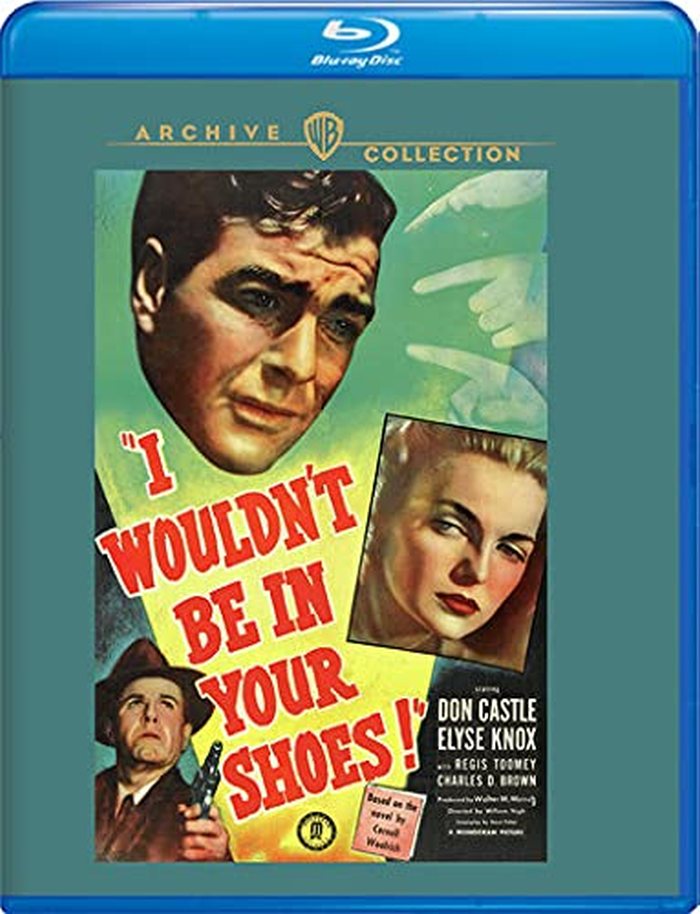
There’s a tendency amongst enthusiasts of film noir to use it as a badge of quality. If some old movie isn’t just some mystery but noir, then it makes it better. It’s instructive to remember that film noir was not some sort of aspirational goal for filmmakers. It was a retroactive labeling of a tendency amongst a group of post-war movies in the ’40s. They were crime or mystery stories, often based on literary works, which pointed to a wound in the American psyche. Can-do American optimism met the horrors of the Second World War and that tension manifested in dark psychodrama. The film noir was the uncovering of the negative aspects of the American dream.
Which doesn’t mean every slightly dark crime movies from the ’40s and early ’50s was some psychological masterpiece. For instance, I Wouldn’t Be in Your Shoes from 1947 is an amalgamation of thin characterization and meager plotting that wouldn’t pass muster in the average major network cop show.
Here’s the story: dancer Tom Quinn is down on his luck, and his wife Ann makes ends meet by teaching lessons to desperate weirdos at a local dance hall. One frustrated night, he tosses his shoes out the window at a pair of amorous cats on a fence. He goes down to find them, but it’s too dark. His shoes, his dancing shoes he needs for getting work, are gone… Except someone returns them in the morning. Weird luck.
Or not, because the yard with the cats belonged to a man that was murdered that night, and the best clue the cops have is a shoeprint, matching Tom’s perfectly. It’s not long before he finds himself on death row, convicted for killing a shut-in who had $60,000 in old bills hidden around his house. Sure, Tom doesn’t have the money, but his shoes were there.
But he does have some of the money. He found a wallet near a fortune telling machine… he brings it to his wife, and makes her swear not to spend any of it until they’re reasonably sure they’re in the clear.
An important aspect of what makes a film noir distinct from a crime movie is that the protagonists have a clear moral choice… and choose wrongly. Film noir is not about ambiguous morality, but immorality. It doesn’t have gray, relativistic morality but clear choices, and the main characters do the wrong thing, even if it’s for understandable reasons. Had Tom never spent those old bills, he would never have been drawn in to the crime he didn’t commit, but which puts him on death row.
The scenes on death row are the most interesting in the film, though they have the least to contribute to the story. The narrative is constructed as a flashback in which Tom is asked by the other convicts why the state needs him to die. It ends up being a clunky and unnecessary framing device, but the scenes of the condemned men interacting have a frisson to them that most of the rest of the film lacks.
I Wouldn’t Be in Your Shoes is based on a novella by Cornell Woolrich, who was the wellspring of a hefty amount of film noir stories. Most famously, he wrote the story which became Rear Window, but he was also responsible for The Night Has a Thousand Eyes, Fear in the Night, and one of Val Lewton’s great horror films, The Leopard Man. Those stories have merit. I Wouldn’t Be in Your Shoes is mostly mediocre. The reveal of the villain at the end hints at a kind of institutional perversity that fits well into the film noir genre, which has at its heart the disillusion of American institutions, but as a narrative it neither thrills nor intrigues. Even at a slim 71 minutes, the story takes too much time to get to its point, and neither of the primary cast members, Don Castle or Elyse Knox, have the star power to paper over the limpness of the film’s dramatic momentum.
The back of the box ad copy describes it as a “film [that] will impress new audiences and, once seen, will not soon be forgotten.” Even this minor adulation is overstating the case. I Wouldn’t Be in Your Shoes is a minor, minor, minor film. It has the constant competence that’s the hallmark of all the classical studio system’s films, but nothing about it stands out. If nothing else, it demonstrates that film noir is a categorization, not a mark of quality.
I Wouldn’t Be in Your Shoes has been released on Blu-ray by the Warner Archive collection. Extras on the disc include a short film, “The Symphony Mystery Murder”, and a cartoon, “Holiday for Shoestrings.”